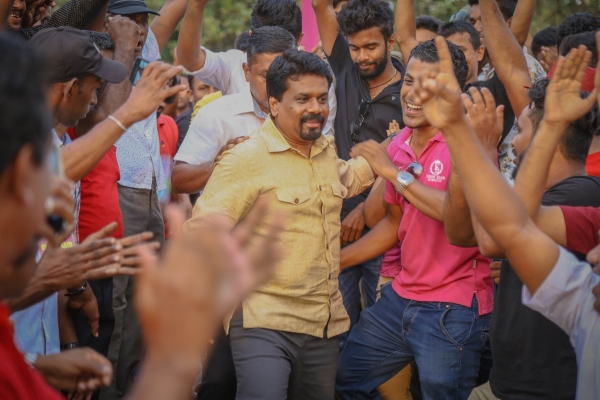The leftist National People’s Power (NPP) is concerned not with the past but the future, NPP leader Anura Kumara Dissanayake said following a discussion with representatives of the Ilankai Thamil Arasu Kachchi (ITAK) in Jaffna.
Dissanayake told reporters on Tuesday June 11 that the NPP in their manifesto for the 2019 presidential election had recognised the need for Sri Lanka’s provincial council system to continue.
“We must also have a dialogue on moving forward. There is a need for constitutional changes. We must also implement the provisions in the constitution that establish peace,” he said.
“In the present, we’re not about the past but how to create the future. To do that, Tamil people should be given a strong guarantee of rights in politics. They must be given a right make decisions for themselves. If everyone lives in the past, we will not be able to create a future,” said Dissanayake.
The NPP leader did not elaborate on the meaning of “right to make decisions for themselves”.
The party has been largely noncommital on its stance on the 13th amendment to the constitution, which the Marxist-Leninist Janatha Vimukthi Peramuna (JVP), which controls the NPP, violently opposed during the late 1980s.
The full implementation of the 13th amendment continues to be a point of debate.
President Ranil Wickremesinghe has indicated his willingness to fully implement the amendment without police powers, particularly in light of India stressing on its importance. Sharing police powers remains an issue, with many nationalist parties in the south arguing against it.
The 13th amendment to Sri Lanka’s constitution emerged from the controversial Indo-Lanka Accord of 1987 as a purported solution to the worsening ethnic conflict, four years after war broke out. Provincial councils came in the wake of this amendment, though land and police powers have yet to be devolved to the provinces as originally envisioned. Both Sinhalese and Tamil nationalists have historically opposed the amendment, the former claiming it devolved too much, the latter complaining it didn’t devolve enough.
A full implementation of the amendment would see land and police powers devolved to the provinces, a development that is not likely to garner support from Sri Lanka’s more hardline parties. In February, sections of the Buddhist clergy took to the streets against the proposed full implementation of the constitutional amendment.


